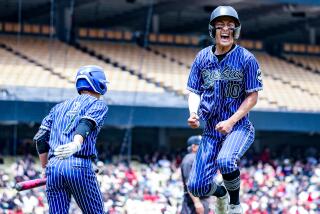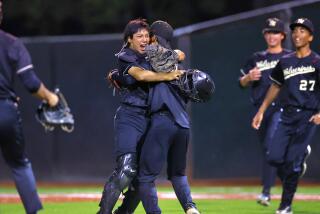Park’s time has finally arrived
- Share via
Joe Park, an All-Southern Section infielder at Cerritos Gahr, has displayed extraordinary perseverance while maintaining absolute loyalty to his parents, who kept denying his repeated pleas to play organized baseball.
Park’s story is about a boy born in the United States to parents who immigrated from Korea and the culture clash he endured to play the game he came to love.
From age 6 to 12, he asked his father, Kyung, if he could play baseball. The answer was always the same.
“I say no,” Kyung said. “We have to go to church on Sunday.”
Park was left in baseball limbo. Spring would come, he’d watch Dodgers and Angels games on television, and seemingly every week bring up his request, “Can I play on a baseball team?”
Despite each denial, Park never threw a tantrum, never rebelled and never disobeyed his father.
“Sometimes he’d cry inside,” his father recalled. “He never cried in his face.”
Park found a way to learn the game the old-fashioned way -- teaching himself by playing with friends.
Living in a Garden Grove apartment complex, he and close to a dozen other boys would hit tennis balls in a quad-like area and have home-run contests. The balls had to clear a garage.
“Everybody wanted to be like Roger Clemens, throwing 90 mph,” he said. “We’d hit windows, run and hide.”
He’d practice catching ground balls by throwing tennis balls off a wall.
It wasn’t as if his dad didn’t like baseball. He watched games on television and took his son to major league games.
But both parents were afraid their son would lose focus on church and academics.
“He knew if I played in an organized league, I’d have to commit my time and make sacrifices,” Park said. “He didn’t approve.”
Park said his father regretted placing too much importance on sports when he was going to school in Korea and he lost out on obtaining a better education.
As for his mother, Park said, “My mom wants me to hit the books, go to college for academics. My mom is always thinking, ‘If you don’t study, you won’t have a successful future.’ ”
When Park reached 10, he followed a friend to a baseball game in San Clemente, and his father had to pick him up. When Kyung saw his son as the lone boy sitting in the stands, not playing, it deeply affected him.
He gave in a little, saying his son could play but still had to wait a few years.
“I was so excited I went to the bookstore and bought ‘The Complete Idiot’s Guide to Baseball,’ ” Park said.
Not until he turned 12 and Park found a friend at his church playing baseball did his father relinquish his concerns.
“My Joe complained, ‘What about him?’ ” Kyung said. “Finally, I say, ‘OK.’ ”
Park joined the Ocean View Little League, showing up for a make-up tryout, wearing jeans and having no baseball equipment and being the only 12-year-old among mostly 7-year-olds. A manager who apparently knew that Park could play the game advised him to perform poorly so he could draft him for his team. But Park didn’t want to spend another day being a hidden talent.
“The first pitch, I hit a home run,” he said. “I was so pumped up. I was actually on a real field.”
Three years later, Park was starting as a freshman infielder at Gahr. Teammates refused to believe the story that he had been playing only since he was 12.
“They said, ‘You’re lying, get out of here,’ ” Park said.
Last season, Park was the co-player of the year from the San Gabriel Valley League as a second baseman. This season, he has taken over as the starting shortstop and went six for six in a game against South Torrance. He is batting .500 with 15 stolen bases -- both team highs -- for the 10-2 Gladiators, who play host to Simi Valley at 11 a.m. today as part of the Redondo tournament.
“He’s mentally tough,” Coach Gerardo Perez said. “He’s able to process the game and slow it down.”
At 5 feet 7 and 140 pounds, Park’s lack of size is another obstacle. He said he has read biographies on Chone Figgins and David Eckstein, successful major leaguers who are 5-9 and 5-7, respectively.
“It keeps me going,” he said.
It will take much more than some scout questioning his size to prevent Park from playing the game he loves.
Asked why he refused to stop asking his father year after year if he could play, Park said, “There were times maybe I shouldn’t have asked him anymore, but it stayed with me, and I stuck with it, and now I’m playing. I want to play as long as I can. Whenever the baseball gods tell me to stop.”
Park’s father is in Gahr’s bleachers, clapping each time his son comes to the plate. He’s a painting contractor who takes time out of his schedule to make sure he can watch his son’s games.
Park wonders what might have happened if he had started playing at 5 or 6, like most of his teammates.
“Honestly, I don’t know,” he said. “Maybe my name would have been known.”
But Park was never going to disrespect his parents’ decision.
“Everybody says I’m mature for my age,” Park said. “I don’t talk too much. I grew up accepting what they told me. I would tell them my opinions and feelings but wouldn’t rebel. I always knew whatever decisions they made was from being a parent and out of love, but I’m thankful for every moment of being able to do what I’m capable of doing.”
Park has a 3.5 grade-point average, still attends church on Sundays and continues to show he can balance school and athletics.
His father, once a roadblock to his playing baseball, has become his biggest supporter.
“Now I know,” Kyung said apologetically. “I learned.”
*
Eric Sondheimer can be reached at [email protected]
More to Read
Go beyond the scoreboard
Get the latest on L.A.'s teams in the daily Sports Report newsletter.
You may occasionally receive promotional content from the Los Angeles Times.







